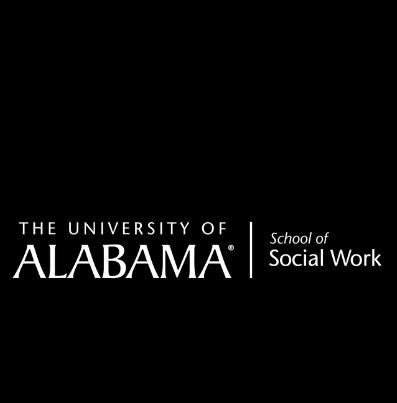

A N N I V E R S A R Y
THE UNIVERSITY OF ALABAMA
SCHOOL OF SOCIAL WORK




A N N I V E R S A R Y
THE UNIVERSITY OF ALABAMA
SCHOOL OF SOCIAL WORK

This year, we celebrate an extraordinary milestone, the 60th anniversary of the University of Alabama School of Social Work. Since our founding in 1965, our School has stood as a beacon of progress, preparing generations of passionate and skilled social workers dedicated to advancing human rights, promoting equity, and driving positive change in communities near and far.
As we reflect on six decades of legendary change, I am reminded of the countless individuals who have shaped our story – our visionary leaders, dedicated faculty and staff, engaged community partners, and most importantly, our alumni and students. From our beginnings in Little Hall to our dynamic and modernized home today, the School has grown into a thriving academic community whose impact is felt across Alabama, the nation, and the world.
Our legacy is defined not just by the programs we have built, but by the lives touched through service, advocacy, and innovation. Together, we have expanded opportunities for students, strengthened our community partnerships, advanced research that informs policy and practice, and cultivated a network of alumni who carry the mission of social work into every corner of society.
Looking ahead, our vision remains bold. We are committed to preparing future social workers who are ready to meet the evolving challenges of our time, whether through trauma-informed practice, digital and global engagement, or tackling pressing issues like climate justice and social determinants of health. The next decade holds tremendous promise, and we are poised to lead with purpose, compassion, and innovation.

This commemorative book is a reflection and a celebration. It tells the story of where we have been, honors the people who built this legacy, and looks forward to the change yet to come. I invite you to read these pages with pride, gratitude, and excitement for the future we will shape together.
Thank you for being part of this journey and for carrying forward the mission of the University of Alabama School of Social Work. Here’s to 60 years of legendary change, and to the generations of impact still to come.
Roll Tide,
Dr. Schnavia Smith Hatcher Dean and Professor
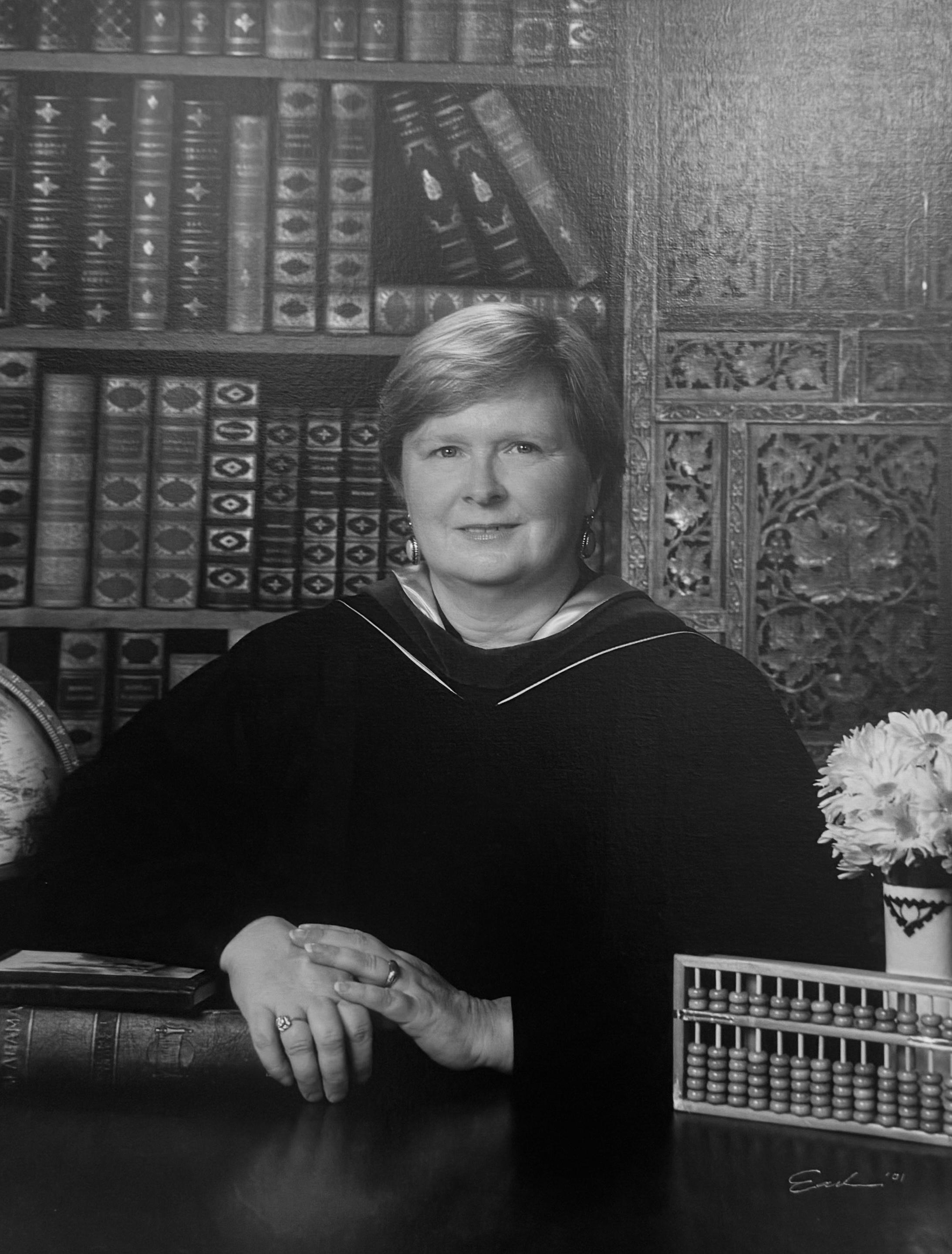
When Lucinda Roff first glanced at a job listing in the bitter February cold of Wisconsin in 1974, she had no idea that it would shape her career for decades. The advertisement was for a field instructor position at the University of Alabama in gerontology, the very area that she had focused on during her master’s program. “I had never been in Alabama. I didn’t know very much about it. I didn’t even know it had a Gulf Coast at that point, but that piqued my interest,” Roff recalled.
Her path to leadership, however, was anything but planned. She started as a lecturer, the lowest faculty rank, and had no thoughts of becoming dean. Yet in 1987, after serving as faculty chair for a dean review, Roff was asked to step in as acting dean. “I was at a state park where we had a little cabin…and they’d left word that I was supposed to call the academic vice president as soon as I possibly could. He asked me if I would become the acting dean while they searched for a new permanent dean,” she said. After considerable thought, she agreed, eventually serving as dean from 1988 to 2000 and returning as interim dean from 2010 to 2014.
Leadership came with challenges. Roff faced pressure to merge the School of Social Work with other units, a move she successfully resisted. “The faculty was united and resolute that we wanted to maintain ourselves as an independent school of social work,” she said. Other trials included handling student academic misconduct and personnel decisions regarding promo-
tion, tenure, and salary increases. “You have to make decisions about people’s lives that they’re not going to be happy about. But for the betterment of the school, you have to make them,” Roff said.
Yet the rewards were just as profound. Roff defined success as helping faculty and students do their best work. “My favorite day of the academic year is Honors Day, which is when we honor students… to me, that’s a success,” she said. She also took pride in developing programs for place-bound students, including weekend college, off-campus courses, and eventually online learning with practice labs for social work skills.
Roff’s vision for the school was rooted in service to Alabama’s most vulnerable citizens. “We want to provide the best educated people to help folks who need it most, particularly in some of our lowest-income areas,” she said. She hopes the school continues to be a “shining jewel in the university’s crown… a place of care and concern and practical help… to the least of these.”
Even after decades in the field, Roff’s impact endures through students and faculty she mentored. “If we can attract talented people, help them be the best people they can, and the best social workers they can, it will be good for the state of Alabama,” she said.

When Vikki Vandiver arrived in Tuscaloosa in 2014 to interview for the role of dean for the University of Alabama’s School of Social Work, a rare snowstorm swept across the city.
“I was giving my colloquium, and it was snowing outside. That room was packed full of people,” she recalled. “I thought, these people have grit. They were warm and friendly, it felt very solid.”
That sense of resilience and welcome helped persuade Vandiver to leave her longtime post at Portland State University, where she had served for more than two decades. “There was something very special about that school,” she said. “It had an interesting collage of faculty and staff and programs, and what made it unique was that it was a freestanding school of social work. That was important to any new dean coming in.”
Early challenges tested her leadership. Within her first year, the school mourned the sudden loss of its associate dean, a beloved figure who had quietly managed the program’s daily operations. “It took a good year and a half or two to restructure the school, to accommodate for her loss and just the grieving that people went through,” Vandiver said.
At the same time, the university was pushing for enrollment growth and stronger national visibility. That expansion required not only more faculty but also a physical transformation. Little Hall, the school’s longtime home, needed to be
renovated to accommodate the faculty, staff, and students. “The building had great history, but it had been renovated so many times that it became a patchwork of offices,” Vandiver recalled.
When the provost asked what she would do with extra resources, Vandiver went to the faculty. Their answer, a third floor, launched a full-scale renovation. The project, completed in time for the school’s 50th anniversary, created bright, collaborative spaces and symbolic touches that reflected social work’s values. “We needed a place that brought together the current faculty, the alumni, people from the past and people in the future,” she said. “I wanted a place of celebration.
But for Vandiver, bricks and mortar were only part of the story. She measured success in the people around her – the faculty she hired, the staff who kept the school running, and the students whose futures the school helped shape. “The heart of any school of social work is the students, the alumni, the faculty and the staff,” she said “Those are the people that will continue the heart and soul of the school.”
Her leadership style, she said, was rooted in teamwork. “Dreams come and go, but the people who are in the trenches, day in and day out, those are the people that really carry the school,” she said.
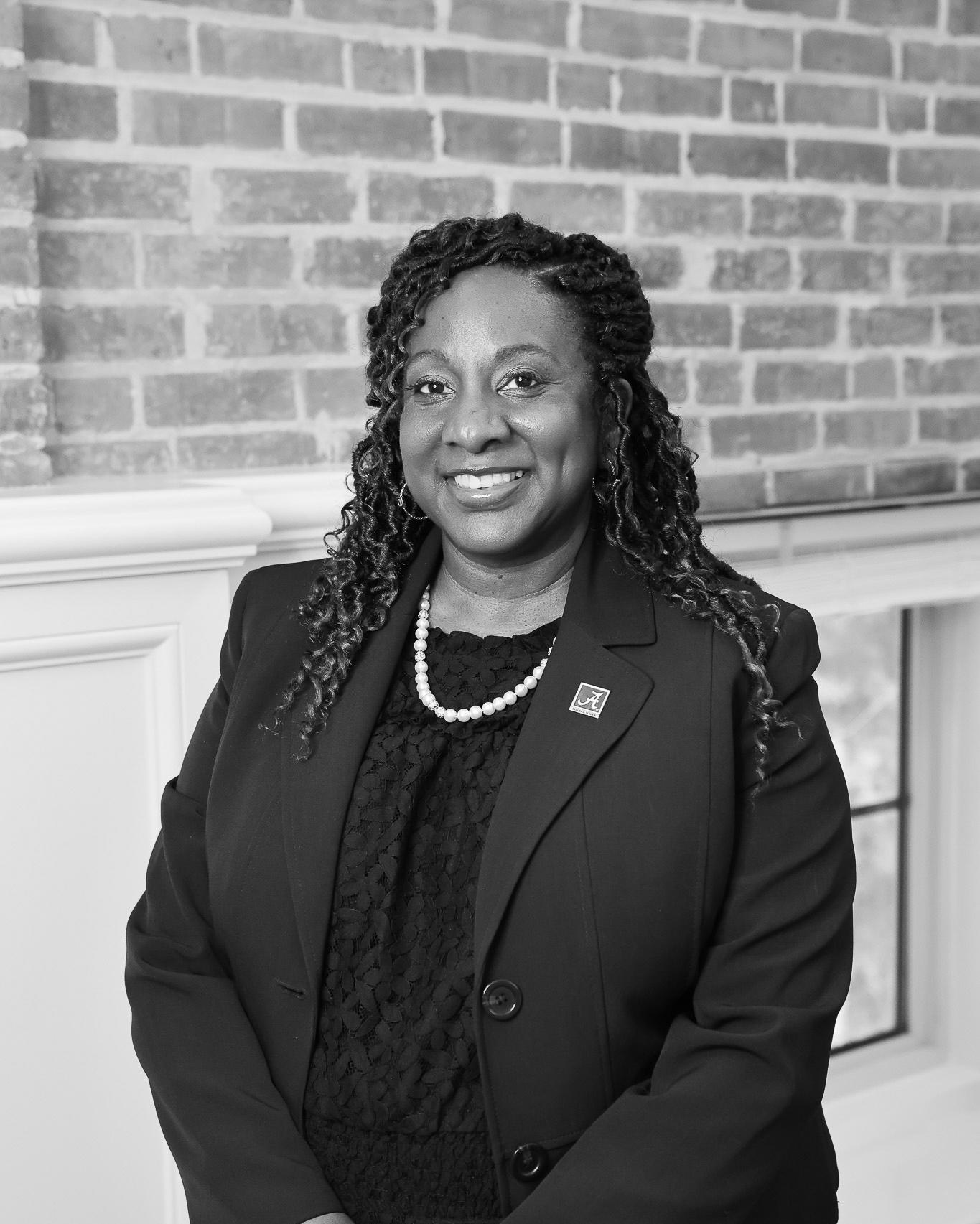
When the University of Alabama School of Social Work celebrates 60 years, Dean Schnavia Smith Hatcher sees more than a milestone. She sees a legacy.
“For me, reaching the 60-year milestone of the School being established is a testament to the enduring legacy and transformative impact of this School of Social Work that was created to bolster efforts of having professionally trained social workers in Alabama,” said Hatcher, a Selma native. “As the Dean, and a Selma, Alabama native, this moment fills me with immense pride and deep gratitude to be part of it.”
Since stepping into her role, Hatcher has made it a priority to strengthen opportunities for students while deepening the school’s ties to the communities it serves. She points first to the people at the heart of the mission.
“I am proud to be part of this dynamic team of faculty and staff members who are dedicated to our students’ success, as individuals and emerging professionals, and the well-being of our community,” she said.
Under her leadership, the school has focused on recruitment and retention, removed barriers for distance learning students, and increased financial support across programs.
Perhaps most notably, Hatcher has spearheaded initiatives that expand the School’s impact beyond the classroom. The newly established Office for Experiential Programs and Community Partnerships houses the practicum program, which has increased placement opportunities that offer stipends and resources to students. The
Black Belt Internship Initiative has extended the school’s service into some of the state’s most economically vulnerable counties, while international collaborations broaden the school’s reach across borders.
The School has also reimagined continuing education by building on virtual offerings introduced during the COVID-19 pandemic. This year, it will launch the Legendary Change Lab Webinar Series, including the Collab for Change series and a new podcast, Transforming the Future, hosted by the Dean herself.
“Social work is rooted in community,” she said. “Our partners help us amplify our reach and our relevance.”
Looking ahead, Hatcher envisions the school’s next decade as one of bold innovation. Priorities include advancing curriculum in emerging areas such as trauma-informed care, climate justice, and digital social work, expanding community-engaged research, and strengthening global collaborations.
“Our alumni are the heartbeat of the School of Social Work’s legacy,” she added, noting that many remain engaged as mentors, practicum instructors, and community partners.
Above all, Hatcher sees the School’s role as preparing students not just for today’s challenges but to lead tomorrow’s change.
“The world needs your voice, your vision,” she said in a message to future students, faculty, and staff. “That’s where change begins. Roll Tide.”
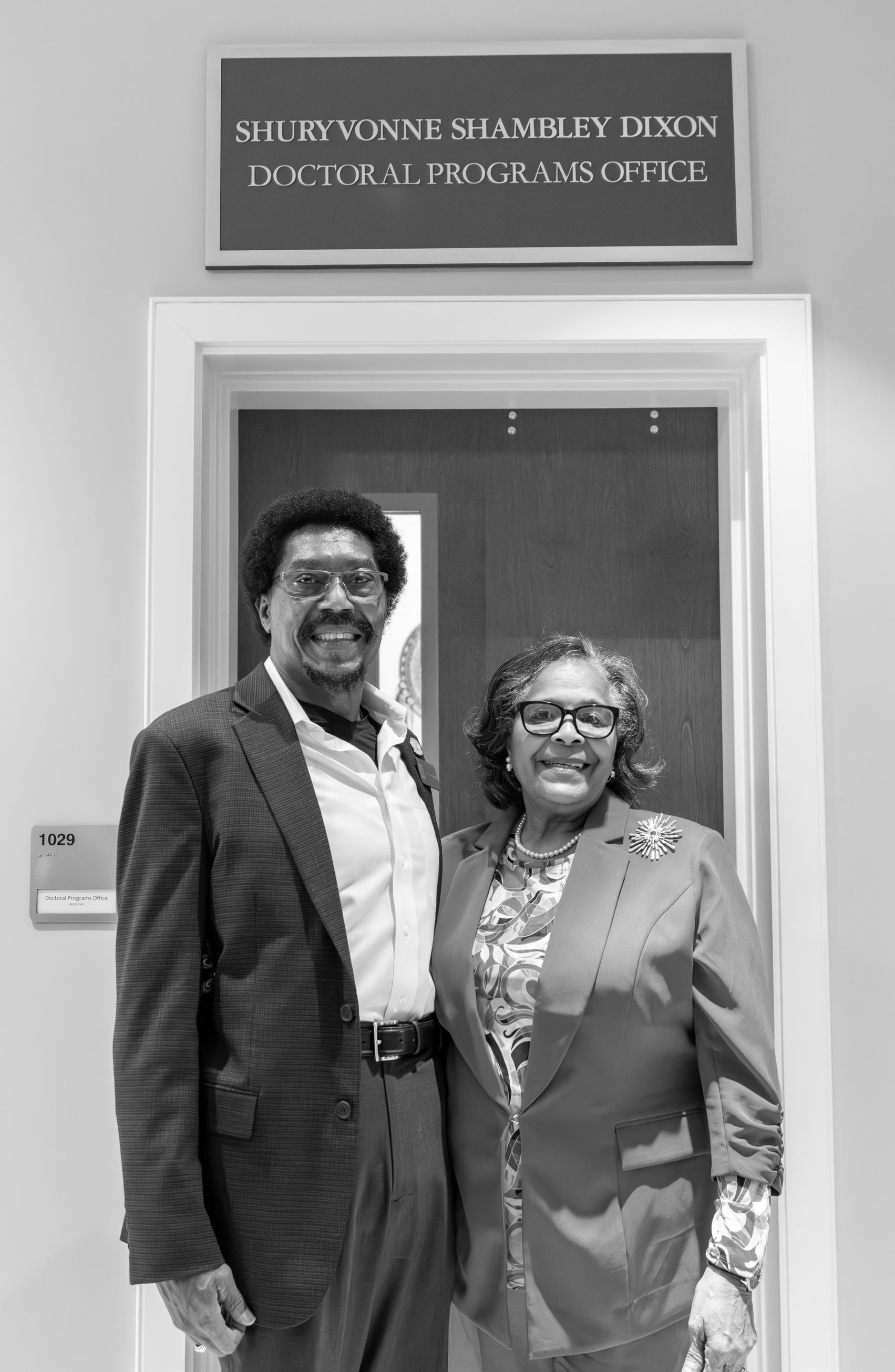
Dr. Harold Shambley and his sister, Shuryvonne Shambley Dixon, carry a lifelong commitment to social work, rooted in their upbringing in the West End of Tuscaloosa during the segregated era and time at the University of Alabama.
For Dixon, the path to social work began early. Growing up in the segregated, social economic climate and becoming a teenage mother, she enrolled in a federally funded youth program that offered GED instruction and job training. She worked at the Tuscaloosa VA Medical Center, assisting veterans and gaining firsthand insight into the challenges families face.
“That experience made me want to help people, veterans, families, anyone in need,” Dixon said. “When I entered the University, I knew social work was my calling.”
In 1971, during her senior year of high school, Dixon was recruited to the University of Alabama, just a year after the University’s full integration. “Being chosen to attend was a prayer answered,” she said.
Her brother’s journey followed a slightly different course. Shambley spent his teenage years working in university dining halls, Bryant Hall, and sorority houses, inspired by the students and athletes he encountered. After serving in the Army during the Vietnam era, he returned home ready to pursue higher education and a degree in Social Work like his sister.
“I always admired my sister as the leader in our family,” he said. “She inspired me to study social work and learn the skills to help others.”
Both siblings also participated in a transformative study abroad program in Guatemala, living with local families and learning about poverty and culture beyond their borders.
“That experience opened my eyes to social issues outside Alabama,” Shambley said. “It shaped my perspective for the rest of my career – even influencing my Army service, where I later served two tours in Panama.”
After graduation, both siblings remained committed to service; their connection to the School of Social Work was renewed years later when they were invited to serve as donors and members of the Board of Friends.
“People give when they are asked,” Shambley said. “That invitation reconnected me to the school in a meaningful way.”
As the School of Social Work celebrates its 60th anniversary, the siblings reflect on the role that the School played in their journey.
“For me, it’s an honor to be recognized as an engaged alum,” Dixon said. “Social work offers so many rewarding career paths, and the opportunities are greater than ever.”
“To return as a donor and supporter, to help students achieve what I achieved, is incredibly rewarding,” he said. “Today, I’m proud to say I’m one of the legends from Tuscaloosa in the School of Social Work.”
Their message to future students is simple but powerful: education opens doors, and giving back ensures those doors remain open for others.

When Coy Stout began his undergraduate studies at the University of Alabama, his plan was precise: join the Air Force through ROTC, serve as a nuclear missile officer, and eventually attend medical school.
“That was my thing,” he said with a laugh. “It’s kind of the opposite of social work.” But life had other plans.
During his sophomore year, Stout came out as a gay man, which prompted him to reevaluate his goals for his career. Wanting to remain in a helping profession, he switched his major to psychology. It wasn’t until his senior year that someone suggested he explore social work.
That suggestion led him to enroll in Social Work 100 with Dean Lucinda Roff, where he learned about the profession’s vast opportunities, from advocacy to policy to community engagement. “I was like, ‘This is it,’” Stout said.
He applied to Alabama’s Master’s of Social Work program and was accepted. By then, he was already involved in HIV advocacy, helping organize one of the first AIDS walks on campus.
An independent study with Professor Madeleine Hill deepened Stout’s interest in the intersection of social work and HIV, leading to a practicum placement at the Whitman-Walker Clinic in Washington, D.C., through the school’s D.C. Practicum Program.
“That experience set me up for the last 30 years,” he said. “It was my social work pivot point.”
The placement both shaped his career and personal life; it’s where he met his now-husband, Jeff. Professionally, it launched him into macro-level practice, policy work, and eventually teaching.
Today, he supports the same D.C. practicum program that helped define his career. As a DSW graduate, Stout also supports the same program through the Faculty In-Residence, while also serving as a senior-level executive for a pharmaceutical company.
Being part of the School of Social Work’s legacy is humbling for Stout. “I never saw myself as being part of anything’s legacy,” he said. “But this school gave me so many skills and opportunities.”
That gratitude drives his commitment to ensure students have access to the same transformative experiences. Through philanthropy, involvement in the Rising Tide campaign, and teaching, he works to connect students with opportunities beyond Alabama.
“For students like me, the chance to work in D.C. or other parts of the country opens up an entirely new view of what’s possible,” he said.
Stout believes the need for social workers is greater than ever.
“Social workers are uniquely positioned to see the intersection of power, environment, and social justice,” he said. “We bring order to chaos, but we do it with people, not for them.”
He added that the profession is broader than many realize. “You might not have ‘social worker’ in your job title, but if you’re using your training to help people navigate challenges and improve their lives, you’re doing social work.”
Stout urges our students to be bold, ask for help, and remain open to unexpected opportunities. “Your journey might take twists you never expected; embrace them.”

When Ann and Jim Langley first walked into Little Hall for Honors Day in 2013, they had no idea that the event would mark the beginning of a deep and lasting connection with The University of Alabama School of Social Work. That day, they met the first recipient of the Laura Langley Social Justice Award – an honor the couple hadn’t known existed until months prior.
Laura Langley, their daughter, graduated from the University of Alabama in December 2011 with a degree in social work after discovering what her mother calls her “purpose and passion” within the walls of Little Hall. Six months later, Laura’s life was tragically cut short. Shortly after her passing, the School of Social Work Association of Community Activities (SWACA) approached the administration to establish an award in her name.
“The award was created without us even knowing,” Ann recalled. “That was such a gift to us, to know that her peers wanted her to be remembered in this way.”
The first honoree, Adrienne, had known Laura personally, and a bond between the Langleys and the young social worker formed quickly.
It wasn’t long before the dean at the time invited Ann, a seasoned nonprofit fundraiser, to join the Board of Friends. From there, the Langleys’ involvement with the school increased. They established a scholarship in Laura’s name the following year and later contributed to naming the student lounge in Little Hall, a space they make sure to visit each time they’re on campus.
For Ann, staying connected to the school is a way of extending Laura’s legacy. “We can’t give Laura more years, but we can help equip others to do the work she cared about,” she said.
Laura’s passion for advocacy took root during a study abroad trip to Ghana.“She came home and told me, ‘You don’t impose progress on people, you help them realize their own progress,’” Ann said. That insight steered her toward social work, where she thrived academically and immersed herself in advocacy, from pushing for bus driver pay raises to organizing protests.
One of her advisors described her as a rare combination of heart and intellect - someone equally motivated by compassion and strategic thinking. Laura gravitated toward macro social work, focusing on social policy and systemic change. While she planned to pursue her MSW in that field, her life was cut short before she could.
The Langleys see the award and scholarship to support students who share Laura’s passion. Over the years, they’ve built relationships with several recipients, many of whom have gone on to make their mark, from earning doctorates to leading advocacy initiatives.
Jim, whose career included corporate work and time with a child-focused nonprofit, says the experience has strengthened his appreciation for the profession. “I got a sense of what social workers do and how important they are,” he said.
As the School of Social Work celebrates its 60th anniversary, the Langleys hope that the School of Social Work will remain a leader in producing skilled, passionate social workers for Alabama and beyond.
“We are just a tiny part of the school’s history,” Ann said. “But if we can help even a few students carry on Laura’s work, then her light is still shining.”
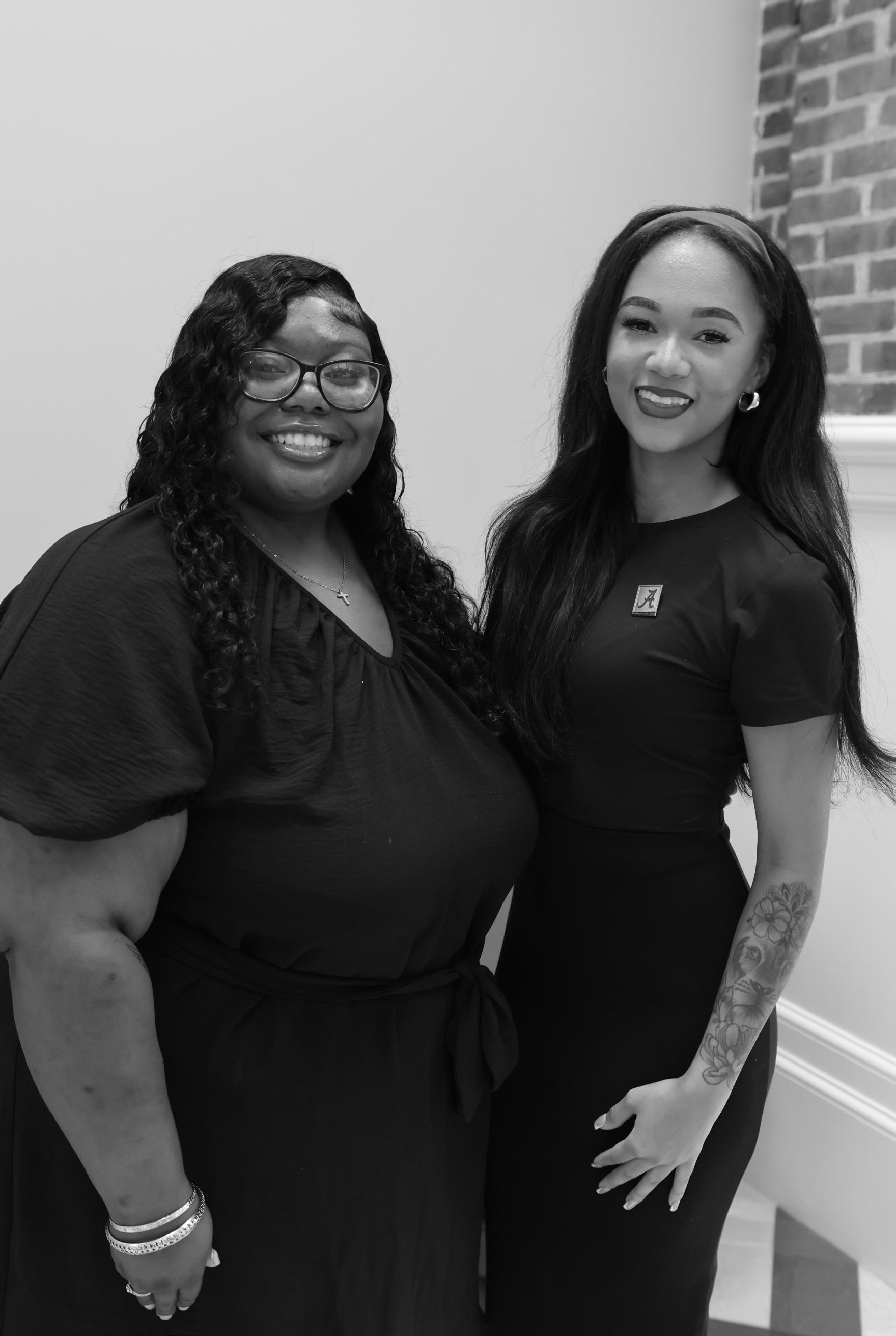
For both undergraduate student Marianna Miller and graduate student Aaliyah Gates, the path to the University of Alabama’s School of Social Work wasn’t straightforward. Yet through unexpected turns, each found her calling in a profession defined by advocacy, service, and resilience.
Miller, a senior from North Dakota, admits her college journey began with uncertainty. She arrived at Alabama as an interdisciplinary studies major, switched to political science, and nearly dropped out before discovering social work. “I remember talking with a girl in one of my classes who was a social work major,” Miller said. “Later, when I realized I wasn’t happy where I was, I reached back out to her, and that conversation helped me decide to switch.”
That decision has shaped her college experience. Now president of the Undergraduate Social Work Organization (USWO) and an ambassador for the School, Miller has taken every opportunity to build leadership skills while supporting her peers.
“I think back to how lost I felt my first year,” she said. “In these roles, I want to be the person who makes students feel welcome, especially out-ofstate students who may be struggling like I was.”
Her involvement extends beyond campus. Through courses taught by instructor Jade Scales, Miller helped with book clubs in schools, conducted research at Jeremiah’s Garden, and participated in the Washington, D.C., Fly-In. She will complete a D.C.-based practicum this spring and hopes to pursue her MSW and JD, focusing on education policy.
For Gates, who grew up in Mississippi, the route to social work began with a love for counseling. As a psychology major, she envisioned becoming a psychiatrist or counselor. But while researching barriers to mental health care for African American women, Gates met a behavioral health director with an LCSW.
“She told me all the things you can do with an LCSW, from counseling to running programs, and it immediately clicked,” Gates said. “I realized social work aligned with everything I wanted to do.”
Since joining Alabama’s MSW program, Gates has embraced opportunities to lead and advocate. She served as vice president of the Graduate Social Work Organization and as a graduate ambassador, roles that connected her with students and promoted the profession. She also represented UA at Advocacy Day in Montgomery and the national D.C. Fly-In, where she met with legislators, including Mississippi’s Senate delegation.
“I’ve been able to represent both my state and this program,” Gates said. “Those experiences showed me how broad social work really is and how much impact we can have.”
Both Miller and Gates credit the School’s supportive community for shaping their journeys.
“The School of Social Work pours into its students,” Gates said. “From day one, I felt welcomed and prepared to succeed.”
For Miller, that support affirmed her decision to stay at UA. “This program changed my life,” she said. “It gave me a purpose, a voice, and a future I’m excited about.”

When Jade Scales first visited Jeremiah’s Garden, she knew it was more than rows of vegetables and fruit trees. To her, it represented possibility, and an opportunity to address food insecurity, strengthen community ties, and teach her students the power of service beyond the classroom.
“Food is a wealth,” said Scales, instructor in the School of Social Work. “Access to healthy food matters. Jeremiah’s Garden is at the forefront of opening opportunities to some of the most vulnerable populations. It’s a way for us to leverage what we do as social workers to make sure the world moves toward equity.”
That vision set the stage for a unique collaboration between Scales and Dr. Luciana Giorgio, assistant professor in the school and a researcher specializing in health and well-being. Together, the two faculty members co-created a project that connected their students with Jeremiah’s Garden. This Tuscaloosa nonprofit delivers fresh produce to families across West Alabama, including rural Black Belt communities.
The partnership paired Scales’ community practice course with Giorgio’s PhD-level qualitative research class. BSW students gained hands-on experience in community engagement, while doctoral students conducted interviews and analyzed data to help the garden strengthen its programs.
“It gave our students the chance to mentor and learn from one another,” Scales said. “We didn’t even realize at first how beautifully it would come together.”

For Giorgio, the project also reinvigorated her research approach. “Research can often feel siloed,” she said. “This reminded me that research matters, and that it can make an immediate difference if it’s done in a way that’s community-engaged. It reignited my passion for the work.”
The collaboration quickly moved beyond the classroom. Students helped raise the garden’s visibility by connecting with local media, and faculty shared findings directly with Jeremiah’s Garden board to inform future planning. Plans are currently underway to expand the partnership with an MSW practicum placement and grant-funded opportunities.
For Scales, the garden has become both a professional and personal refuge. She regularly volunteers with her children, teaching them the value of shared work and service. “The impact drives me to continue to enhance my teaching,” she said. “It’s been one of the greatest things I could have done professionally, but also personally. It’s helped my well-being.”
Students, too, have described the experience as transformative, an opportunity to see how issues of food access and equity intersect with their future roles as social workers.
Both Scales and Giorgio emphasize that the project embodies the School of Social Work’s mission of advancing justice through action. “This is why we do what we do,” Giorgio said. “We want our students and faculty to not only talk about service, but to live it.”
As the partnership grows, Scales said she has a straightforward commitment: “I won’t leave. As long as they’ll have us, we’ll keep showing up.”
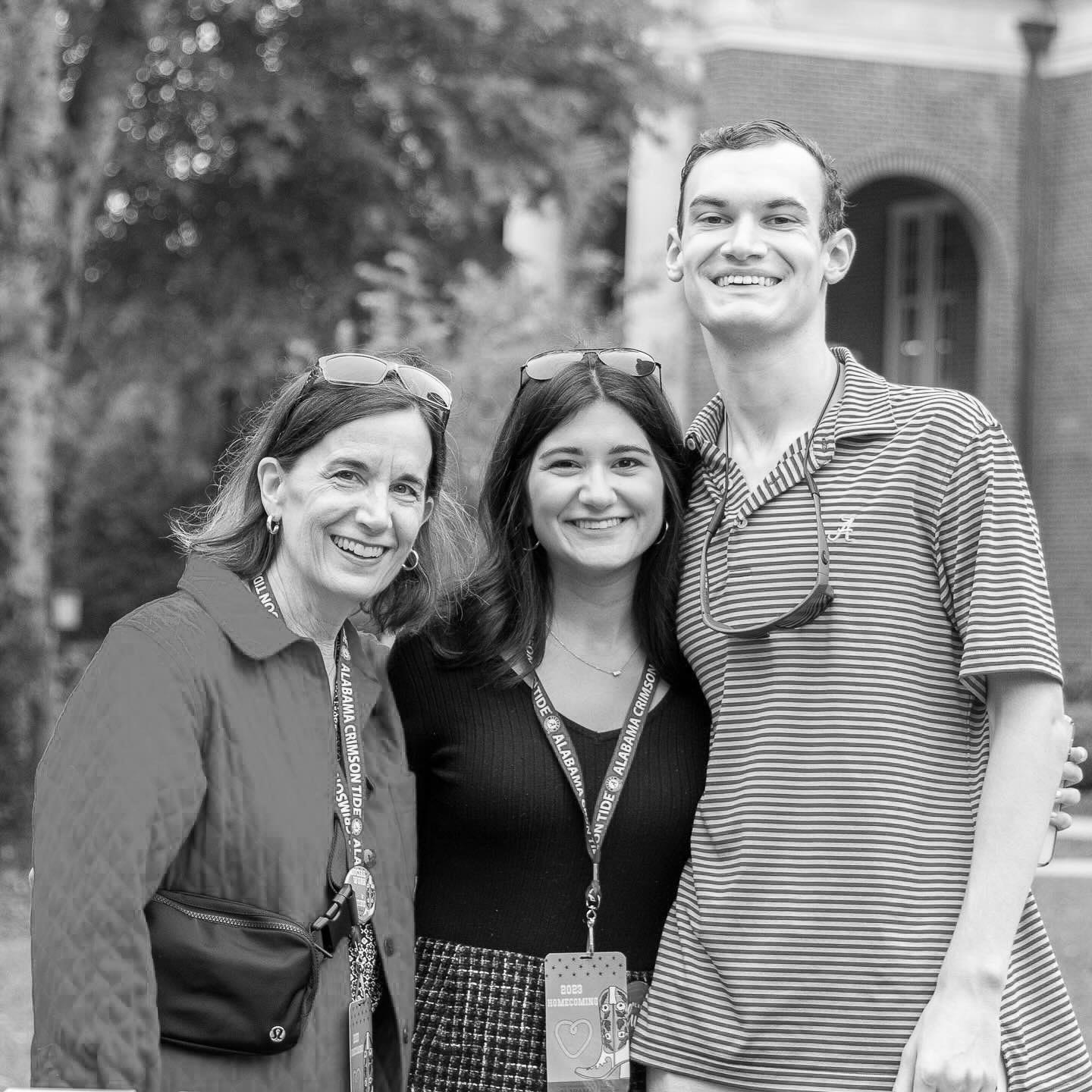
For almost 36 years, Mary Sella has been a cornerstone of The University of Alabama School of Social Work, witnessing and shaping the evolution of the school she calls home. “I’ve done everything from event planning to scholarship management to PR and advising,” Sella says. “The job has changed so much over the years that I don’t feel like I’ve ever had the same job twice. In addition to my staff role, I have also enjoyed teaching as an adjunct faculty member.”
As an undergraduate at The University of the South in Sewanee, Tennessee, Sella wasn’t sure what she wanted to do following graduation. One day, her advisor told her that he recognized her potential for social work. “He recommended that I should look into social work, and that set me on this path,” she recalled. After taking a few years to work in Washington, D.C., including volunteering with a suicide prevention hotline, she returned to Alabama to earn her MSW from The University of Alabama, where she graduated in 1988. A call from Dean Roff and Dr. Rich Crow led her to the school in 1989, and she’s been there ever since.
Sella has seen tremendous transformations in her tenure. “When I started, there was no internet, no email. Everything was done by letters or walking across campus,” she recalls. Sella also noted that the student body was much smaller than it is today, and that the faculty members typically handled advising the students themselves. As time passed, the school began to grow, developing dedicated advising roles and expanding programs. Through it all, Sella’s role evolved,
but her commitment to students remained constant.
“For me, the most rewarding part has been seeing students succeed,” she says. “Helping students develop a plan to graduation is so fulfilling and I love hearing from alumni years after graduation. They often share how their education was instrumental in shaping them into the professionals they are today.” Sella’s dedication extends beyond traditional advising. She has developed and taught classes, coordinated Bama Bound orientation, and cultivated personal connections with countless students.
What makes the School of Social Work special, Sella notes, is the tight-knit community of the school. “Our students are passionate about making change. They come here with a goal, and they’re supported by faculty and staff who know them and understand their goals,” she says.
As the school celebrates its 60th anniversary, Sella reflects on her time with the school with gratitude. “I love working in higher education, and I love working with our students. It’s an honor to be part of their journey and to witness how the school has grown.”
For Mary Sella, decades of service are more than a career; they are a legacy of mentorship, dedication, and an unwavering commitment to the next generation of social workers.
For Max Sleep-Frankel and Dr. Courtney Chapman Thomas, the University of Alabama’s DSW program has been more than an academic milestone. It has been a launching pad for leadership, advocacy, and innovation in the field of social work.
When Sleep-Frankel began his journey through the DSW program, he wasn’t quite sure what to expect. He knew that he wanted to grow as a leader, but he didn’t anticipate how quickly the program would reshape the way he thought about his work. “What I learn in class, I can use right away,” he said. “It makes the program very real. It’s not just theory; it’s something you can bring into practice the next day.
For Sleep-Frankel, who continues to balance his studies with professional responsibilities, that immediacy has been a defining part of his DSW experience. The program’s design allows him to stay rooted in the field while gaining new tools to think critically and lead more effectively. Just as important, he said, has been the community of classmates who bring their own experiences to every discussion. “It has been inspiring to be part of a group that is so committed to the profession.”
That same sense of inspiration is what carried Dr. Courtney Chapman Thomas through her journey in the program. Chapman Thomas used her time in the DSW program to explore leadership in social work, a theme that still guides her today. She recalls the program as a space that allowed her not only to sharpen her skills but to think more boldly about her career. “It gave me confidence to step into new opportunities,” she said. “I’m able to look at my work differently now and approach challenges more strategically.”
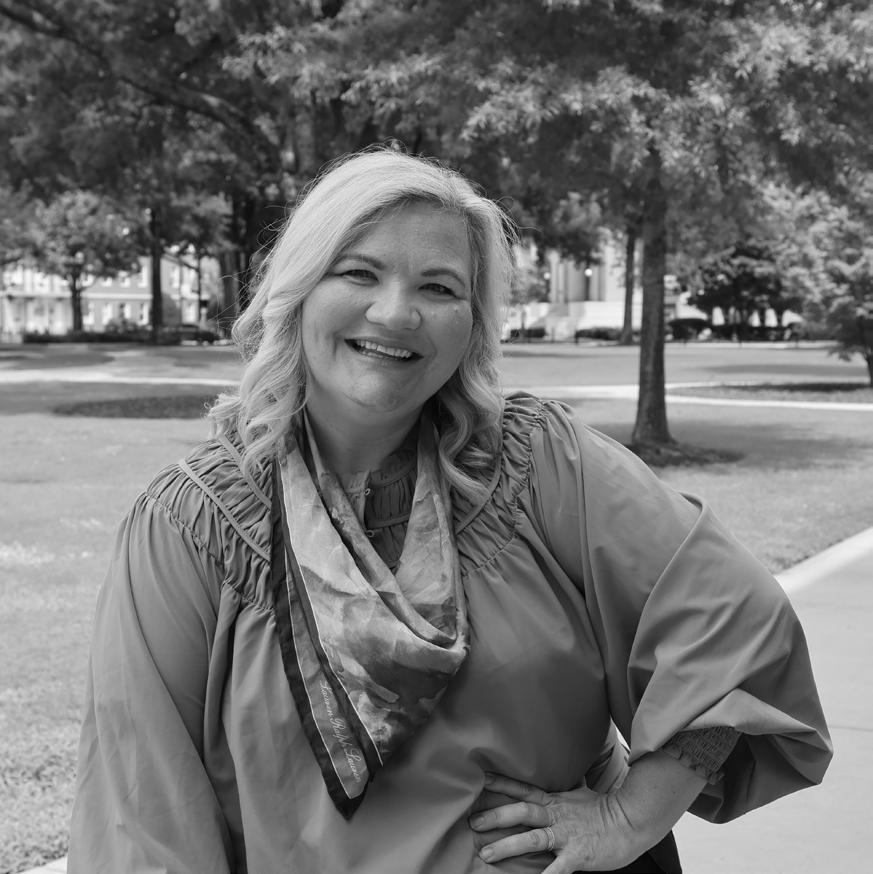

Her reflections echo what Sleep-Frankel has found in his coursework, that leadership in social work isn’t just about titles, but about vision, adaptability, and the ability to create space for others. Both point to the program’s flexibility as essential, allowing them to pursue their studies while also managing their professional lives, as well.
For Chapman Thomas, that balance made completing her doctorate possible. For Sleep-Frankel, it’s what keeps him grounded as he works toward the finish line.
The two represent different points along the same path, yet their experiences speak to the same outcome: a program that shapes leaders who are ready to strengthen the profession. Sleep-Frankel, as a therapist, and Chapman Thomas as the Director of Experiential Programs and Community Partnerships for the University of Alabama School of Social Work, have used the skills they have learned in the DSW program to shape their career.
“The DSW program has opened the door to what’s possible in my career,” Chapman Thomas said. Sleep-Frankel, still mid-journey, feels much the same. “I wanted to build on my clinical background, but I also wanted to learn how to lead in new ways,” he said. “This program has given me that.”
Dr. Karen-Thompson Jackson and Dr. Hyunjin Noh are two leaders at the University of Alabama School of Social Work whose careers reflect a commitment to education, advocacy, and community.
Thompson-Jackson’s journey into social work began with a family legacy. “My grandfather’s background is in education. My mom was into sociology,” she explained. But financial considerations shaped her path. “I could stay at Stillman or I could figure it out and come over to the University of Alabama and do social work, so I took a leap of faith, and I am so glad I did.” Her decision led to a lifelong commitment to helping students and communities thrive.
“It’s about the relationships for me, the intersectionality,” Thompson-Jackson stated. “I am so proud when someone from the School of Social Work says, ‘I either have a research opportunity or I want to learn more about XYZ in the community,’ and I am able to connect them to the resource.” Her advocacy extends beyond the classroom. Serving as an elected school board official, she explained, “When I am able to advocate as a social worker about those barriers and how that impacts the students’ learning ability, it is just a different feeling.”
For Noh, social work offered a chance to make a tangible difference. “I was determined to do something that is tangible, meaningful, something that can make direct impact on people’s lives. Social work was something that arose to the top.” From undergraduate studies to her PhD, she never doubted her path. As the PhD program director, Noh takes pride in the achievements of her students. “I am beaming with pride whenever I see our PhD students graduating…all of them have already secured tenure track assistant professor or full-time instructor positions at esteemed schools of social work across the nation.”
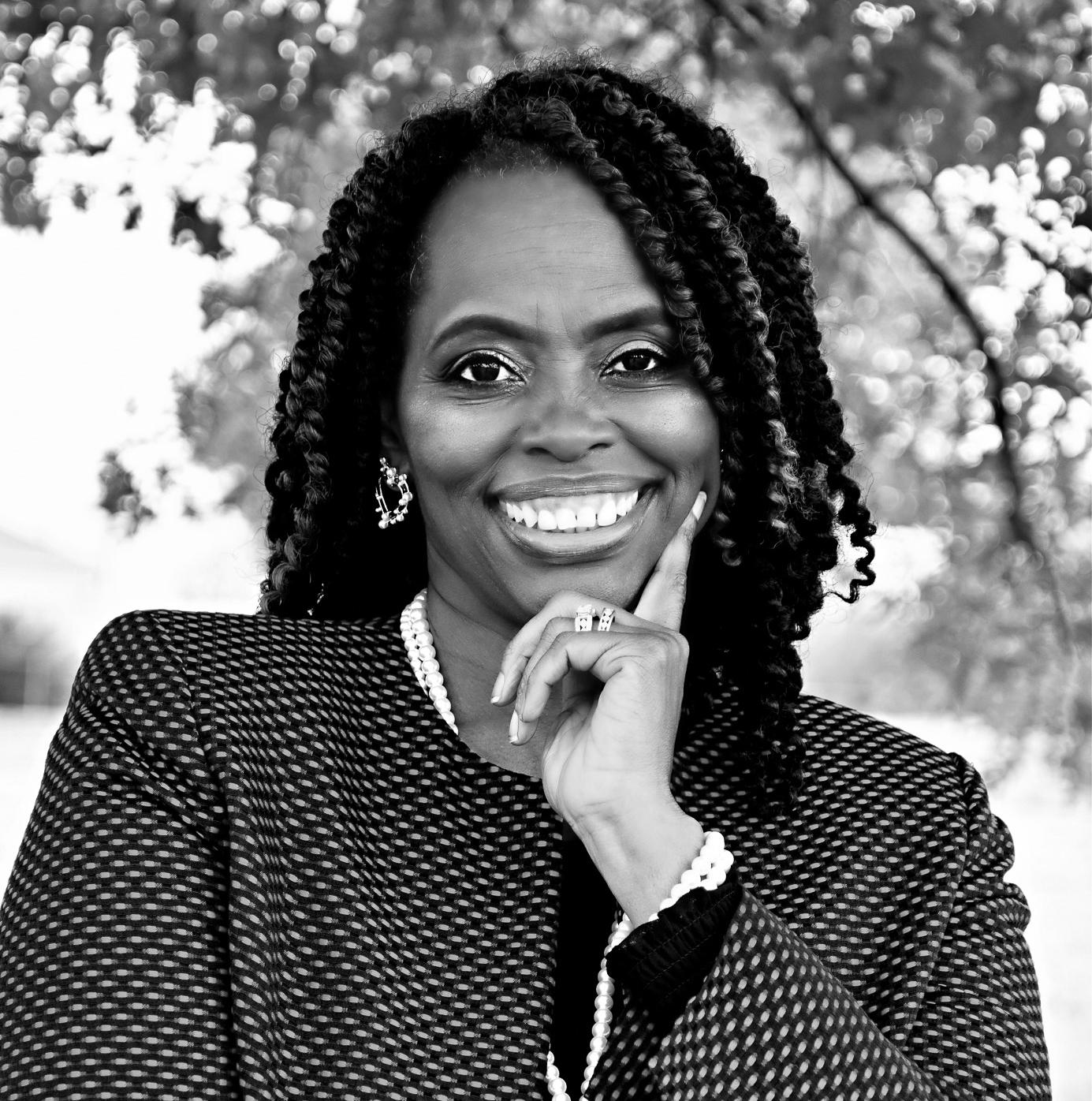

Both scholars highlight what makes the school unique. Thompson-Jackson noted the power of experiential learning: “When they graduate, we have tentacles all throughout the United States. They’re not just here, they’re everywhere.” Noh emphasized the school’s research partnerships: “We know how to collaborate and partner with our community leaders and the stakeholders to ensure their voices are heard from the very beginning, so that it is not just a top-down approach, but it is more of a collaborative partnership.”
Honors like Noh’s recognition as a We are UA campaign ambassador and Thompson-Jackson’s Buford Peace Award reflect their contributions. Yet both remain grounded. “I just get up and go to work,” Thompson-Jackson said. “This is what we do every day - promote peace.” Thompson-Jackson was also awarded a $1M Bezos Grant for workforce development, and Noh gives back to the School as a donor to support doctoral students and professional development opportunities.
Looking ahead, both envision continued growth and influence. Thompson-Jackson hopes that more young people would choose social work as a profession. “I would love to see the wave of 11th and 12th graders say, ‘I want to be a social worker,’” Thompson-Jackson said. Noh wants their program’s research and training to be recognized globally, “I want to see our graduates be hired at other R1 institutions across the nation, then demonstrate the training they’ve received to other PhD cohorts and even globally.” Together, they are cultivating leaders, strengthening communities, and advancing social work with purpose and heart.

When Kimberly Gibson transferred to the University of Alabama, she couldn’t have imagined her career would one day bring her back to campus—this time with Alabama Athletics. As a licensed clinical social worker supporting student-athletes, Gibson is proof that social work skills can extend far beyond traditional practice. Her introduction to the field was almost serendipitous.
While playing junior college soccer, Gibson met Barbara Nicol, then a UA registrar, who encouraged her to consider social work.
“I wanted to work with people, provide support in some way,” Gibson said. “Barbara told me I could do all that and more with a social work degree. That was a lightbulb moment for me.”
After transferring to Alabama, Gibson immersed herself in the School of Social Work, where professors pushed her beyond her comfort zone. A pivotal moment came during the Washington, D.C. program with Carol Phelps. When her original practicum placement shifted unexpectedly, Gibson embraced the change, working in a residential treatment facility for boys ages 8 to 18. Sports became her bridge to connection. “I was using sports as an intervention before I even knew that sports social work was a thing,” she said. “It was a way to build relationships and strengthen skills.”
Years later, her passion for both fields merged formally. Through the Alliance of Social Workers in Sports—where she served on the executive committee and helped plan symposiums— Gibson deepened her knowledge of the profession.
At the same time, she worked in the School’s office for experiential programs, where she built relationships with athletics staff. Those connections opened doors to something new: the creation of social work roles within Alabama Athletics.
Today, Gibson works directly with student-athletes, helping them navigate challenges both on and off the field. Much of her role centers on case management - connecting athletes with resources, addressing needs, and serving as a steady source of support.
“With all the pressures student-athletes face, it’s a privilege to walk alongside them during such a transformative time in their lives,”
Gibson said. “They’re balancing academics, competitions, practices, and their personal growth. To be there as an additional resource means everything.”
Her training, she added, is at the core of what makes her effective in this setting.
“The magical thing about social work is that your skills are transferable anywhere,”
Gibson said. “Connecting with people, assessing needs, problem-solving—those skills are valuable whether you’re in a hospital, a school, or athletics.”
Looking ahead, Gibson is excited about the profession’s expanding reach.
“I love that the School of Social Work is highlighting different areas where students can take their skills,” she said. “It’s about building a strong foundation while opening the door to all the opportunities social work has to offer.”
For Gibson, that door led to the sidelines of Alabama Athletics. For future students, she hopes it opens even wider.
For Nicole Ruggiano, associate dean of research at the University of Alabama School of Social Work, a career in social work began when she discovered that she wanted to help others. “Early on, I had to be a caregiver for my grandparents,” she recalls. “Seeing how they navigated health care services and how older adults were treated, I knew I wanted to make a difference.” Her commitment to supporting older adults eventually led her to earn a PhD in public policy with a focus on gerontology, blending her studies with real-world impact.
After completing a national fellowship for geriatric social work researchers alongside her husband, also a social work scholar, she transitioned from Florida International University to join UA when a faculty position opened.
In her role as associate dean, Ruggiano is fostering a culture of research that values every contribution, regardless of scale. “We have faculty engaged in large, funded studies and smaller projects,” she says. “At the end of the day, all of them are making a big impact in communities and people’s lives. Celebrating that impact helps everyone feel valued.” This inclusive approach has empowered both faculty and students to pursue meaningful research that touches lives locally and nationally.
Ruggiano values mentorship in her position as the associate dean of research. From doctoral students to faculty, she provides guidance on advancing research agendas, navigating academia, and building collaborative projects. “PhD students need to learn how to assemble a research team or manage a multi-contributor writing project,” she said. “These experiences give them a sense of who they want to be as scholars.” Over her career, Ruggiano estimates that she has served on nearly 40 doctoral committees, demonstrating her dedication to the next generation of social workers.
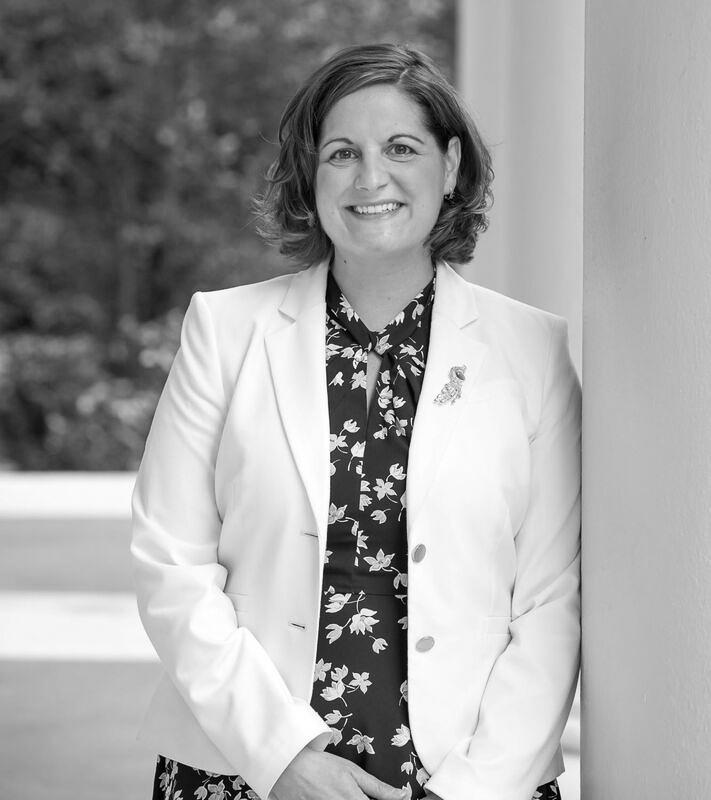
Her impact extends beyond the Capstone. Ruggiano regularly volunteers in community workshops on health literacy, serves on the Alabama Lifespan Respite Coalition, chairs the Research and Innovation Subcommittee for the Alabama House Task Force on Alzheimer’s Disease, and has contributed to national policy through the American Political Science Association’s Health and Aging Policy Congressional Fellowship.
As the School of Social Work celebrates its 60th anniversary, Ruggiano notes how the school sets standards for other schools. “We set standards for using social work skills to advance research,” she says. “Our work is not only impactful but also a model for other schools of social work across the country.”
Through research, mentorship, and community engagement, Nicole Ruggiano exemplifies the university’s mission: turning scholarship into tangible scholarship change for those who need it most.
For Terrell Richardson and Nicholas Burnett, the journey to the University of Alabama School of Social Work’s PhD program was defined by their resilience, service, and a desire to help others. As first-generation students, both of their stories demonstrate how personal experience can inspire professional purpose.
Richardson’s path began at a small HBCU in North Carolina, where he discovered his passion for social work through the example of his cousin. “All I knew was that I wanted to help people,” he says. After earning a master’s in education with a focus on student affairs, he realized he wanted to address barriers to mental health and higher education. After also graduating with his MSW, he realized how much that degree opened the door to research, mentorship, and teaching, shaping his aspiration to become a tenure-track professor and, eventually, a college president. “I want to mentor students, conduct research, and teach. That is what will bring me the most satisfaction,” he says.
Mentorship has been critical to Richardson’s journey. From Dr. Sharon Parker, who first introduced him to research, to Dr. Sebrena Jackson and Dr. Daphne Cain, who guided him through academia, Richardson emphasizes the importance of mentorship in higher education. “My teaching influences my research, and my research influences my teaching,” he explains.
Burnett’s story, shaped by military service and personal adversity, illustrates the power social work has when applied to the real world. After seven years of active duty and one year in the National Guard, Burnett returned home to confront family conflict, systemic barriers, and PTSD. “For the first three years, no one cared that I had PTSD,” he recalls. Encountering social workers at the Veterans Affairs residential treatment program became a turning point.
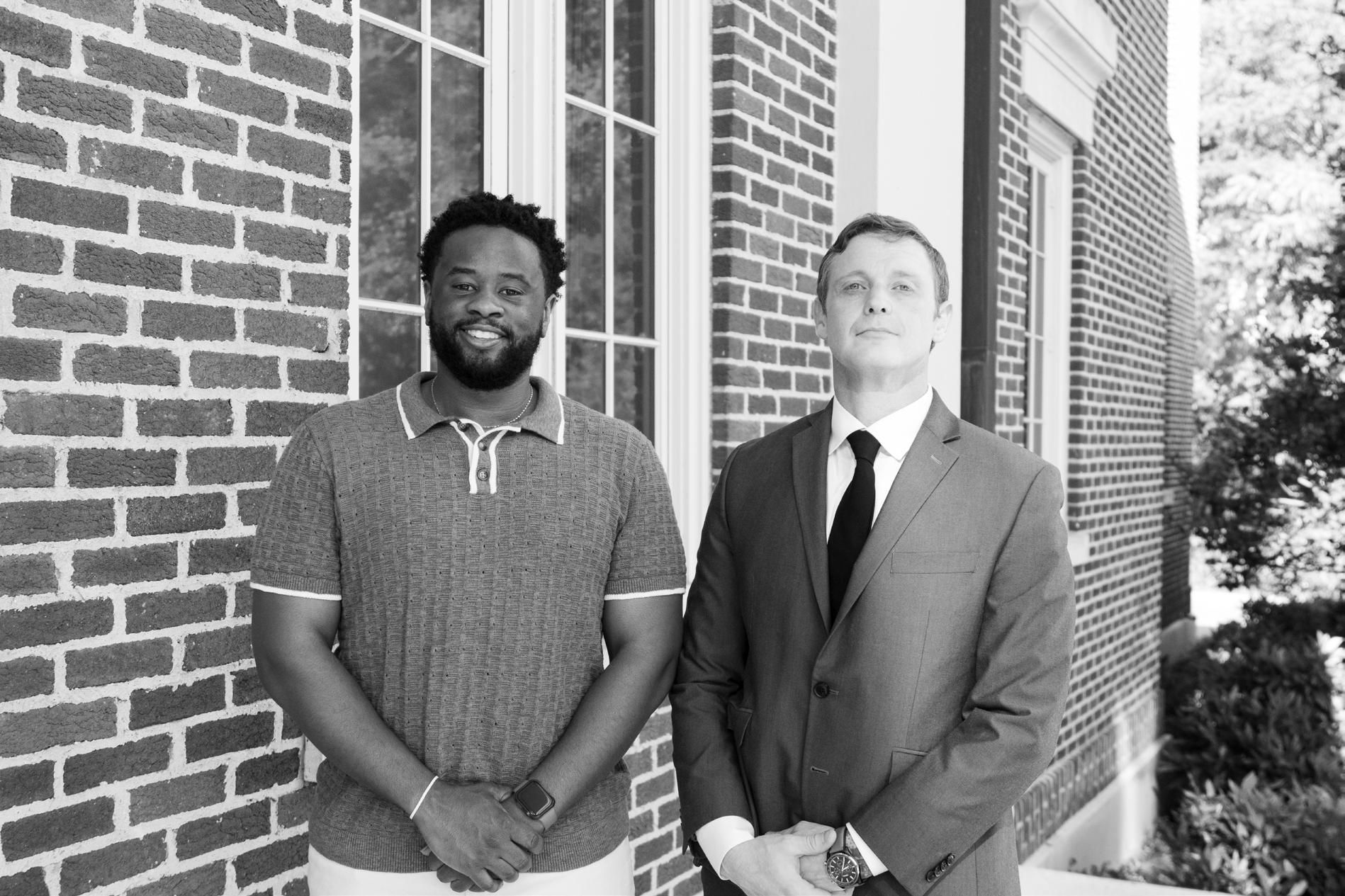
“They showed me that maybe this is something I could do one day, become a social worker and help other veterans experiencing these problems,” he says.
Burnett now focuses on transitional issues for veterans, particularly those returning from combat, with first-generation backgrounds, or from low socioeconomic environments. He has mentored veterans through university life, helped them navigate VA services, and explored how childhood trauma affects later challenges. “Veterans often carry the weight of the experiences silently,” he says. “Seeing their shoulders lift when they receive support, that’s one of the most rewarding experiences of my life.”
His vision extends globally. With experience living in Brazil and being partially fluent in Portuguese, Burnett hopes to collaborate with social workers abroad and study social work interventions in high-conflict communities like São Paulo’s favelas. “Social work is uniquely positioned to meet people where they are and lift them to a stable reality,” he says.
Despite different backgrounds, Richardson and Burnett share a commitment to leveraging lived experience to inspire change. Richardson focuses on academia and mentorship; Burnett emphasizes advocacy and systemic reform. Both embody the principles of social work: service, justice, and helping others reach their potential.
As the School of Social Work celebrates its 60th anniversary, the journeys of Richardson and Burnett illustrate the transformative power of education, mentorship, and lived experience in shaping the social workers of tomorrow.


$100,000+
Dr. Coy A. Stout II and Mr. Jeffrey S. Falk
Ms. Amy B. Mansue
Mrs. Barbara G. Bonfield
Mr. John L. Prewitt
Dr. Ginny T. Raymond
Ms. Jeanne-Marie S. Burke
Mr. and Mrs. Maurice F. Kahlmus Jr.
Mr. Philip L. Browning
Dr. and Mrs. Harold D. Shambley
Mr. and Mrs. Donald M. James
Vulcan Materials Company Foundation (Mr. and Mrs. William L. Maxwell)
Dr. Kevin J. Corcoran and Dr. Vikki L. Vandiver
$50,000+
Dr. David L. Klemmack and Dr. Lucinda L. Roff
Dr. Hyunjin Noh and Mr. Changjae Lee
The Caring Foundation of Blue Cross and Blue Shield of Alabama (Mr. and Mrs. Tim King)
Donald M. James Family Foundation (Mr. and Mrs. Donal d M. James)
Gilead Sciences Foundation (Ms. Kate Wilson)
$25,000+
Mr. and Mrs. C. Richard Moore Jr.
Raymond James Charitable Endowment Fund
Tuscaloosa Civitan Club (Ms. Barbara and Mr. Malcom G. Beavers)
Mr. and Mrs. Ernest M. Tims
Mr. Paul Jackson and Dr. Karen H. ThompsonJackson
Mr. and Mrs. Kenneth Hill
Mrs. Clare Anderson
Dr. Linda and Mr. Craig L. Nutt
Dr. and Mrs. Jerry L. Milner
Ms. Malika I. Moore
$20,000+
Mr. and Mrs. William S. Hereford
Dr. Barry J. Ackerson and Mrs. Theresa A. Miller
Bryant Bank (Mr. and Mrs. Claude D. Edwards)
Ms. Veronica J. Elder
Southern Company Services, Inc. (Mr. and Mrs. C. Alan Martin)
$10,000+
Dr. Phillip E. Crunk
JLP Fairhope Enterprises LLC
Mr. and Mrs. Coy A. Stout
Dr. Karen Clements-Crunk
Bradley Arant Coult Cummings LLP (Mr. and Mrs. Jeffrey C. Schrupp)
Mr. and Mrs. Denson N. Franklin III
Ms. Alice H. Haas
Mr. and Mrs. James W. Sellers Sr.
Dr. Maleena A. Sumrall
Mr. and Mrs. Scott M. Phelps
Collaborative Solutions, Inc. (Dr. Russell L. Bennett)
Dr. Nora D. Zee
Dr. Russell L. Bennett
Mr. and Mrs. Gary J. Clarke
Mr. and Mrs. Harold E. Pugh
Mrs. Helen S. Robinson Estate
$5,000+
Claude Bennett Family Foundation (Mrs. Katherine Bennett-O’Leary)
Dr. John M. Bolland
Mr. and Mrs. James Dupree Jr.
Mr. and Mrs. Philip G. Piggott
Mrs. Shuryvonne S. Dixon
Dr. and Mrs. John T. Land
The Faulkner Family Foundation (Mrs. Patricia C. Faulkner)
Ms. Becky S. Corbett
Dr. and Mrs. James P. Adams Jr.
Dr. and Mrs. Tom Cook
Mr. Tony D. Walker
Dr. Avani A. Shah
Southern Company Charitable Foundation Inc. (Mr. Mike Anderson)
$1,000+
Mr. and Mrs. Jeff Arnold
Mrs. Julia B. Caddell
Dr. Tina L. D. Peterson
Ms. Jane B. Welden
National Christian Foundation Alabama (Mr. Ricky Brooks)
Ms. Madeleine M. Hill
Mrs. Bettye C. Pressley
Dr. and Mrs. Eric G. Mackey
Mr. and Mrs. Sam H. Reid Jr.
Dr. and Mrs. Frank P. Costanzo
Mr. and Mrs. Peter H. Hodkinson
Ms. Martha A. Bozeman
Dr. Carla and Mr. Cleophus Thomas Jr.
Mr. Alvin J. Reed
Ms. Linda G. Bibb
Dr. and Mrs. John C. Ziegler
Dr. Schnavia and Mr. Allan S. Hatcher
Mr. and Mrs. Barry W. Goggins
Mr. and Mrs. Leroy H. Benton III
Mr. and Mrs. Thomas L. Patterson Jr.
Mr. William L. Gormley
Mrs. Angela L. McClintock
Mrs. Pamela S. Hudgens
Ms. Marie M. Garner
Mrs. Kathy Falk
Mr. Elvin J. Loop and Mrs. Jeannie A. Duke
Professor Hee Yun Y. Lee
Ms. Dianne F. Harrison
President Dianne F. Harrison
Mr. and Mrs. Jake Shanahan
Mr. and Mrs. Patrick R. Gibson
$1,000+
Mr. James A. Slaughter
Mr. Joseph M. Upton and Dr. Bethany Womack
Mrs. Onya Johnson
Dr. Laura and Mr. Holland G. Hopson
Drs. Ronnie and Mary S. Jackson
Want to be a School of Social Work Donor? Scan the QR Code to support the School!

Dr. Barry Ackerson
Ms. Shuryvonne S. Dixon
Dr. Russell Bennett
Dr. Tom Cook
Mr. James Dupree
Ms. Veronica J. Elder
Mrs. Laurie Faulkner
Mrs. Pamela Green
Mrs. Caroline Hodkins
Mrs. Deborah Land
Ms. Ann Langley
Ms. Amy Beaulieu Mansue
Mrs. J. Miller Piggott
Mr. Johnny Prewitt
Mr. J. Wayne Sellers
Dr. Harold Shambley
Dr. Coy A. Stout, II
Dr. Karen Thompson-Jackson



